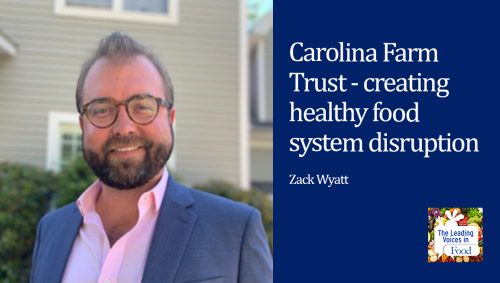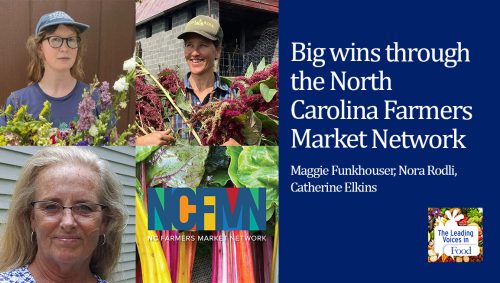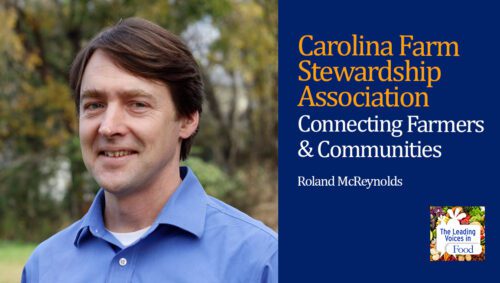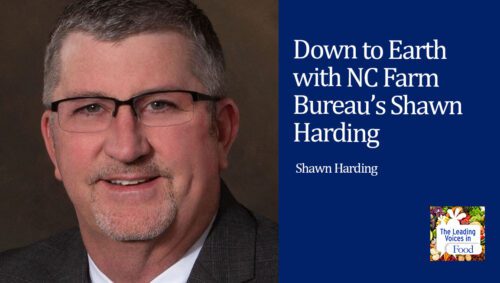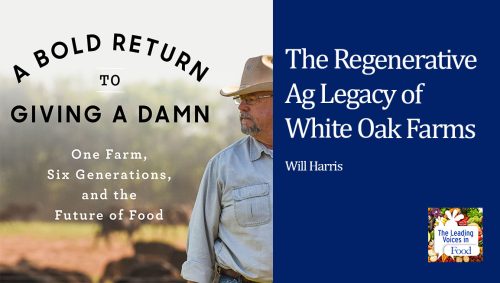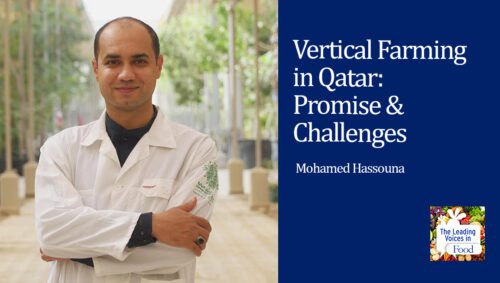The Leading Voices in Food
E75: Land Grant University Gold for North Carolina
Agriculture is a remarkably complex, fascinating, and important topic. We all eat of course, but often we don’t know much about the story of our food, how it gets produced, where it comes from, how technology, for example, can help provide wholesome, healthy, and safe food, and more. There are some remarkable people out there who see the big picture and who understand both the past and future of agriculture. One such person is our guest, Richard Linton.
Subscribe: Apple Podcasts | TuneIN | Google Podcasts | SoundCloud | PocketCasts | Radio Public
Tags: Agriculture & Tech | Food Policy | North Carolina | Regenerative Agriculture | Urban Agriculture |

Richard Linton is the dean of the College of Agriculture & Life Sciences at North Carolina State University. He earned a doctorate in Food Science from Virginia Polytechnic Institute and State University. His research focus encompasses modeling the growth and inactivation of foodborne pathogens such as Listeria, Escherichia coli, and Salmonella within different food systems, and; development of rapid detection technologies for biological and chemical foodborne hazards. Throughout his career, Richard has worked with various segments of the food and agricultural industry integrating applied research projects and impactful outreach programs. Nationally, he has been recognized by the Institute of Food Technologists (IFT) for his leadership in research and outreach programs with the Howard Macy Award and the Myron Solberg Award.
Interview Summary
So let’s begin with this. You’re in a land grant university, but not everyone might know what land grant universities are, or why they’re so important in agriculture. Can you explain?
Sure. I can tell you from firsthand experience, there’s a lot of research and education and outreach that’s dedicated to agriculture and food systems going on at the Land Grant University system around the United States.
I earned a bachelor’s, master’s and PhD all at Virginia Tech University, and my career has expanded across three other land grant universities, Purdue University as a faculty member, the Ohio State University as a department head, and now very proudly as the Dean at NC State university.
A Land Grant University is focused on serving the people. It’s the people’s university through research, teaching and outreach. And the outreach component is done through a cooperative extension that works through teaching. We produce an educated workforce ready to tackle the grand challenges of agriculture and food systems.
Through research and extension combined, we create new tools and innovations, and then we share this information with the citizens of our state. For example, if we identify a new technology or a new production practice at the farm level that could improve coin yield, we would utilize our vast extension network to share this information, and educate farmers on the benefits.
We can do that throughout the state because of our strong cooperative extension network. We’re the only country in the world that has universities that are focused on the land grant mission, and have this broad cooperative extension message to translate this information to end users.
So Rich, let’s go right to some of those big picture issues that you just referred to as grand challenges. What do you see the grand challenges being for agriculture today?
Arguably the most important one is finding solutions to help feed our rapidly growing population. From the years 2000 to 2050, our global population will nearly double, and we must find a way to feed them. And that’s not an easy challenge. New innovations will be essential to improving yields for plant and animal products, despite facing new disease, decreasing farmland, less access to water, and increasing environmental concerns.
This past year, the National Academy of Science, Engineering and Mathematics published a report that identified five breakthrough areas that will be critical to explore if we want to be able to feed a growing population. First and foremost, we need to create a systems-based approach. We need to focus on understanding the nature of interaction among the different elements that incorporate the food and agricultural system, and how they can be leveraged to increase overall system efficiency, resilience and sustainability.
This report also went on to say that rapid detection and monitoring system, and application and integration of data science, gene editing, and an increased understanding of the microbiome, will all be essential creating a successful and sustainable future.
That connection between human health and agriculture and food systems was also identified as a key need for research and education. Prior to the National Academy report that I just mentioned, the Association of Public and Land-grant Universities, or APLU, assembled to be able to put together a committee to improve human health and reduce chronic disease, things like diabetes, heart disease, hypertension, by integrating food, environment and agricultural systems through alignment of science, education, community engagement, and strategic partnerships.
This is an important issue. This is a critical issue for agriculture. In order to feed our people and keep them healthy, it will require significant effort and a drastic change in our approach, and that new approach needs to start happening now. While we’re doing a good job with agriculture research, and an equally good job with human health research, we don’t do a very good job of leveraging them together.
We are not lacking in development of new technologies. What we need to do is focus more on consumer education and effective education for the end user, the farmer, and the agribusiness person. Then hopefully we can increase the rate at which new technologies are embraced.
Tell me how North Carolina State University and North Carolina itself are in a unique position to tackle some of these big challenges, and are there some of the key areas that your own college is focused on?
It’s a great question, Kelly. I don’t know of any other state in the nation that has the capacity to partner and lead like we do in North Carolina. North Carolina has a very robust agriculture and life science industry. North Carolina State, North Carolina A&T State University, are a lead agricultural university. The University at North Carolina, Chapel Hill tops in public health, and Duke of course is a world leader in policy.
There are several large life science businesses like Syngenta and Bayer Crop Science that are conducting research in our state, as well as hundreds of entrepreneurs and small business people.
We have the benefit of being located within about 20 miles of Research Triangle Park, where there are over 650 life science companies. In addition to the tremendous amount of talent and industry developing in our area, we are also fortunate to live in a very agriculturally diverse state. We have many different soil types and climates, and over 90 different commodity groups.
As a university we have 18 different research stations and 10 field laboratories spread across the state to take advantage of the soil and climate diversity, and our cooperative extension network is the second largest in the country. NC state partners with community leaders in all 100 counties to identify and develop solutions for local challenges.
Our college is focused on five programmatic areas, the Plant Sciences Initiative, the North Carolina Food Innovation Laboratory, the Food Animal Initiative, student access and leadership programs, with additional resources slated to improve water use and water management, and of course what we’re talking about today to build a better connection between human health and agriculture in food systems.
So it’s very impressive how diverse North Carolina is, as an agriculture state. I was impressed with that when I moved here nearly six years ago, and it’s really been eye-opening, and I’m happy you are able to highlight that.
Let me move on to a little bit different topic. You were appointed by the governor of North Carolina as the chair of the Food Manufacturing Task Force, a group that evaluated the opportunities to grow food manufacturing in North Carolina. Can you talk a little bit about the work of the task force, and are there lessons from that, that might apply nationally?
Yeah, in North Carolina as a state and an NC state, we’re trying to tackle the challenges of plant systems and agriculture from all angles in all aspects. The plant sciences initiative will be housed in Raleigh, North Carolina, and this looks at improving yield and quality of plants. But we also have the plants for human health institute that’s located in Kannapolis, North Carolina, that identifies health-promoting compounds from plants that are used to prevent disease.
The North Carolina Food Manufacturing Initiative’s goal was to produce new and novel food products that are considered value added, and that they are more convenient for consumers, they taste better, and/or they can be beneficial to health. This summer we will open the North Carolina Food Innovation Laboratory also to be housed in Kannapolis, North Carolina.
This new initiative will help us find solutions to new value-added products. Another goal of this initiative is to find ways to grow the agricultural economy in North Carolina. An economic feasibility study showed that value-added plant products could boost to our economy in North Carolina by more than $10 billion, and create thousands of new jobs, adding to an already strong $87 billion agricultural economy.
Another great reason that the North Carolina Food Innovation Lab makes really good sense to do, I think what we’ve seen nationally, is other land grant universities trying to mimic some of the great work that we’re doing here at North Carolina State in the connection between plant systems and productivity, and human health.
But also things that can be done for the state to be able to create jobs and boost the economy. So all very good reasons to move in this direction.

